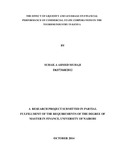| dc.description.abstract | Liquidity and leverage risk are considered as one of the serious concerns and challenges for financial performance in organizations. Towards this end, the research sought to establish effect of liquidity and leverage on financial performance of commercial state corporations in the tourism industry in Kenya. The relationship between liquidity with leverage on financial performance was explained through various theories such as Trade– off Theory, Pecking Order Theory, Market Timing Theory, Modigliani and Miller Propositions and Liquidity Theory of Interest. The study adopted descriptive research design where data was retrieved from the Balance Sheets, Income Statements and Notes of ten (10) Commercial State Corporations in the tourism industry in Kenya during the period 2008-2012. Correlation and multiple regressions were applied to assess the impact of liquidity and leverage on financial performance measured with profitability. The findings of the study were that the profitabilities of the Commercial State Corporations in the tourism sector in Kenya are negatively affected by increases in the liquidity gaps and leverages. A positive relationship exists between the commercial state corporations in the
tourism industry liquidity and profitability. The results of this study reveal a significant
impact of all the factors of liquidity and leverage on financial performance of commercial state corporations in the tourism industry in Kenya. An increase in liquidity ratio by these state corporations will help them to increase their profitability. One of the
recommendations is that it is imperative for the commercial state corporation’s
management to be aware of its liquidity position in different product segment. This will
help them in enhancing their investment portfolio and providing a competitive edge in the market. It is the utmost priority of a commercial state corporation’s management to pay the required attention to the liquidity problems. These problems should be promptly addressed, and immediate remedial measures should be taken to avoid the consequences of liquidity. | en_US |

